College in the COVID-19 Era
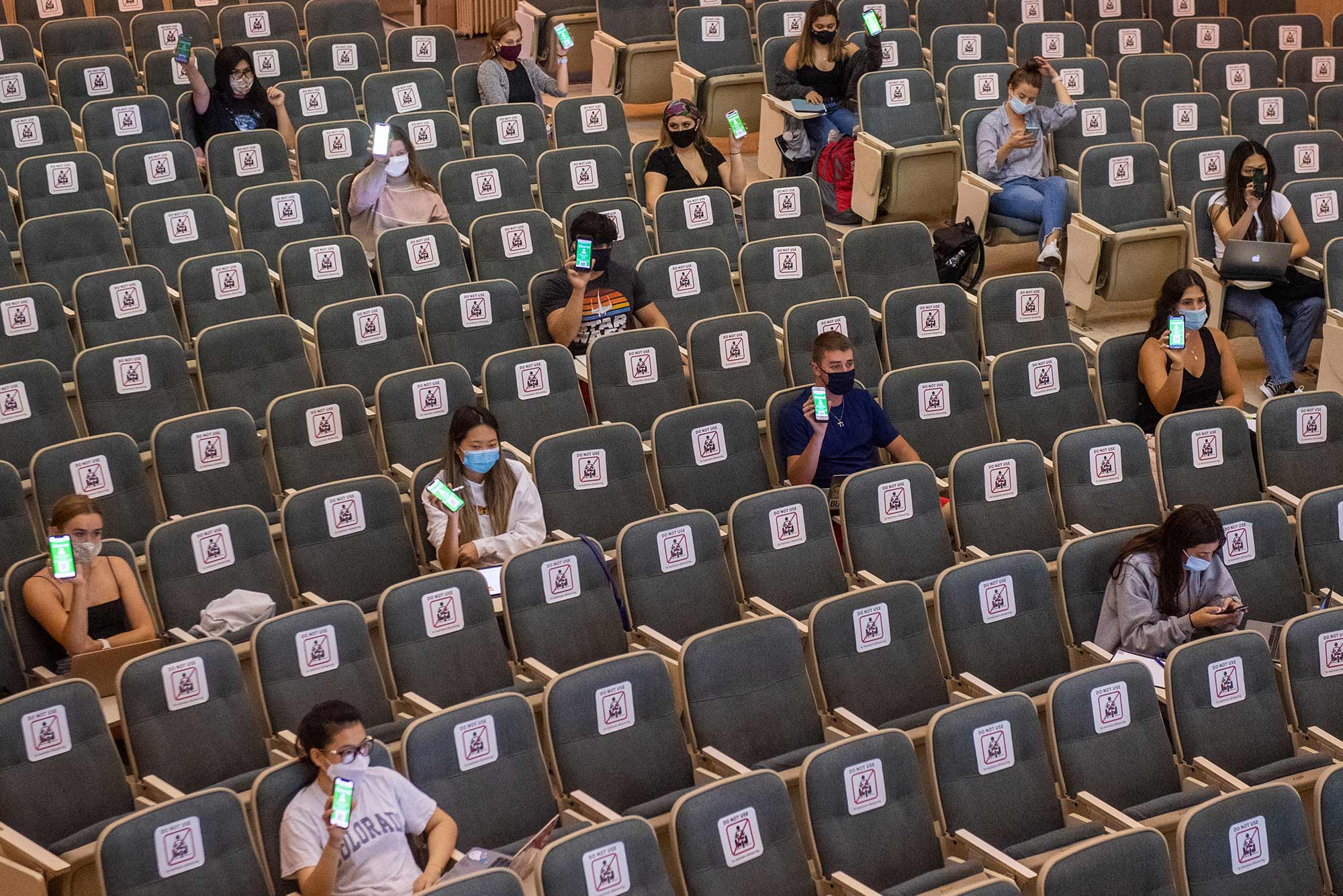
Students showed their emails confirming they are symptom-free at the start of a human physiology class in Morse Auditorium on September 2, 2020. Stickers were placed on seats to maintain social distancing. Photo by Cydney Scott
College in the COVID-19 Era
Three BU students talk candidly about how the pandemic has upended their senior year
Taking remote classes in her childhood bedroom in Kennesaw, Ga., last spring, Archelle Thelemaque would look at the bulletin board above her desk and see the BU pamphlet she’d stuck there four years prior. The pamphlet reminded her of why she chose BU, of how excited and nervous she was at the start of freshman year. Thelemaque, a Posse Foundation Scholar—public high school students with extraordinary academic and leadership potential who may be overlooked in the traditional college selection process—has thrived at the University in the years since. So when BU announced its campuses would reopen this fall, Thelemaque (COM’21) had no doubt what she wanted to do.
“I thought about whether or not I would stay at home for maybe 10 seconds,” says the public relations major. “What drove me to come back is the whole element of it being senior year. And I also just love Boston.”
But Thelemaque returned to a campus drastically changed by the coronavirus pandemic. Gone were the large lecture hall classes, the Dog Pound packed into Agganis Arena to cheer on the hockey team, and entire dorm floors gathering for Sunday night check-ins with their RAs.
Instead, the University gave students the choice of attending in-person or remote classes with its new hybrid teaching format, Learn from Anywhere (LfA). The idea is to deliver the same academic experience to all students, no matter where they are studying from.
BU also established a new set of restrictions and protocols—including regular COVID testing, required face masks, and strict social distancing—in an effort to prevent the spread of COVID-19 and keep classrooms open. This fall, there are approximately 15,700 students learning in person (they physically attend at least some of their classes) and 13,000 who chose to study remotely. Classrooms and dining halls have been completely reconfigured, and FitRec is operating only at 40 percent capacity. Athletes are practicing on campus, but they aren’t competing in games this semester.
Bostonia talked to three seniors about how college life was changed this fall: Thelemaque, a student ambassador at the Howard Thurman Center for Common Ground, an active member of the Black student union Umoja, and an intern at communications firm Ketchum; Sunnie Kong (CAS’21, GRS’21), who’s from Vancouver, Canada, and is pursuing a bachelor’s in biochemistry and molecular biology and a master’s in biotechnology; and Michael Stone (CAS’21), an English major and the starting goalie for the men’s soccer team, who comes from Boca Raton, Fla.
Move-in was radically different this year. Typically taking place over one week, it was spread out over two weeks to avoid crowds. At the same time, students were required to be tested for the coronavirus at five COVID testing collection spots, with undergrads tested weekly and submitting daily symptom reports. Those who test positive are quarantined in special housing. Although Kong, Stone, and Thelemaque are back on campus, they are taking most of their classes remotely.
Kong: Because my parents have always been really hands-off with me, I’ve moved in every time by myself. I have a lot of independence. My mom is concerned about me at school, but I think less about COVID and more just in general. Because of the current pandemic, the protests…we have connected a lot more than we normally would.
Stone: My dad is at high risk for COVID, so we were pretty safe and smart when I was home in Florida. There, I feel the rules and wearing a mask are very loosely enforced. On campus I live in StuVi-2, and coming from a higher-risk state, I had to stay quarantined until I got my third negative test.
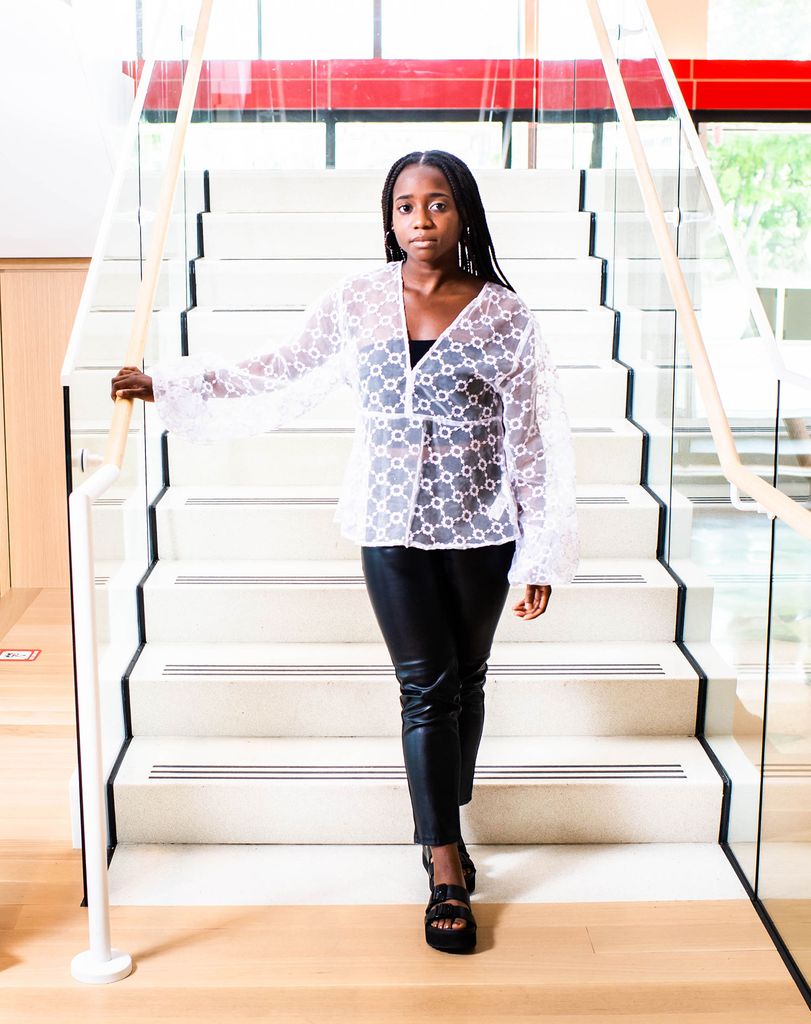
Archelle Thelemaque (COM’21)
Photo by Jackie Ricciardi
Thelemaque: The weirdest part was trying not to touch doors and holding up my ID and stuff against plexiglass. It was super weird coming back from the South and seeing everyone on the street with masks and kind of skirting around each other. It was like Russian roulette in the South; any grocery store or public place—it was a huge gamble if people would wear a mask or not. The best part about BU’s handling of this is that the testing has been super reliable. It puts me at ease. It’s just that certainty of knowing if you’re sick or not.
Kong was among more than 900 students who remained on campus last March when the University announced that the rest of spring classes would be conducted remotely. They were able to petition to stay in BU housing for extreme reasons, such as difficult home lives or financial hardship. Kong was allowed to stay because as an international student she feared that she wouldn’t be allowed back into the United States come fall. Her life has been turned upside down by more than the pandemic. Her father died of cancer in April. Later, her paid summer job and free housing were canceled, and that meant she fell further into debt. A friend suggested she turn to crowdfunding to help pay her tuition; thus far she has raised more than $8,800.
Kong: I’ve been on campus since March. It was sad how quiet it was on campus. I had to appeal to stay, and that was granted, but then I heard my dad was really sick in China. At that point, I couldn’t go all the way to China. My mom and brother couldn’t be there either, but our extended family was there when he passed away. Because I wasn’t able to go to a funeral, I was left with no sense of closure, so I don’t even know if his death has really hit me yet. Even now, months later, I don’t think I’ve processed it completely. When people comment about how hard it must be, I say, yes, it’s hard, but I don’t really know what I’m supposed to be feeling. It doesn’t feel real to me, much like the whole situation we’re in right now.
All three students are adapting to remote learning and safety precautions as best they can this semester.
Kong: Classes are going well. I’m also teaching a few labs for Chem 101. It is so weird, trying to get the freshmen to participate—I know I didn’t want to as a freshman. But I met most of my friends through that class, so it’s important for them to talk to each other.
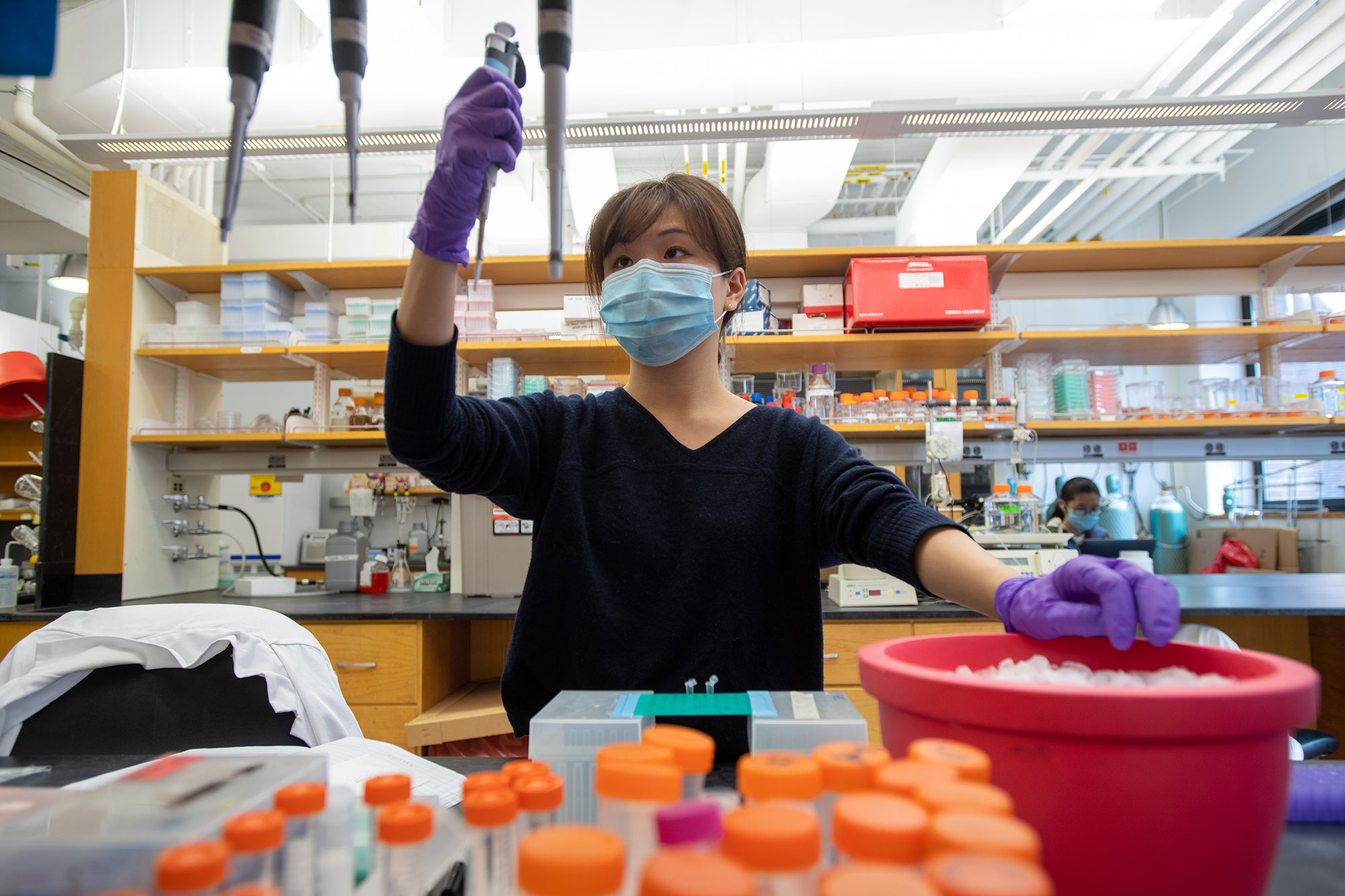
Both the lab settings for my job and class have been de-densified. My class used to be four hours long, twice a week, and we would do partner work, but now it’s half as long, and it’s by ourselves. The room has been sectioned off so that everyone has their own corner. There’s tape and stickers on the floor showing us where to stand or sit.
Stone: All of my classes are online. This semester, I find that professors are more willing to listen to us, to see what worked and what didn’t work in the spring. And it seems like they’re making changes to what suits the class best. Like today, I had a one-on-one Zoom call with one of my professors, a check-in meeting, and I didn’t have any of those last semester. I liked that; it’s helpful.
Thelemaque: I’m taking pretty much all of my classes online right now. With virtual classes, I feel like I’m in the classroom, though, because professors are finding ways to make sure group work is a huge element of class. I’m in a virtual lecture and then, boom, I’m in a breakout room.
There’s one class I have the option to go [in person] for. I’m actually going over there for a class discussion. I’m feeling like things have been going so well in terms of low numbers of sick students. And while getting sick is not a chance I’m willing to take, I’m definitely comfortable going into my in-person classes now. It feels like the plan in place is working and people are actually following the rules.
But not everything about remote learning is working; students report some frustrations and trial-and-error moments in their classes.
Stone: I don’t like that you don’t really get to have the face-to-face interaction with people in your class. Last year, I would try to talk to at least a few people in my classes. But now it’s pretty tough because it’s just taking a shot in the dark trying to find someone to connect to.
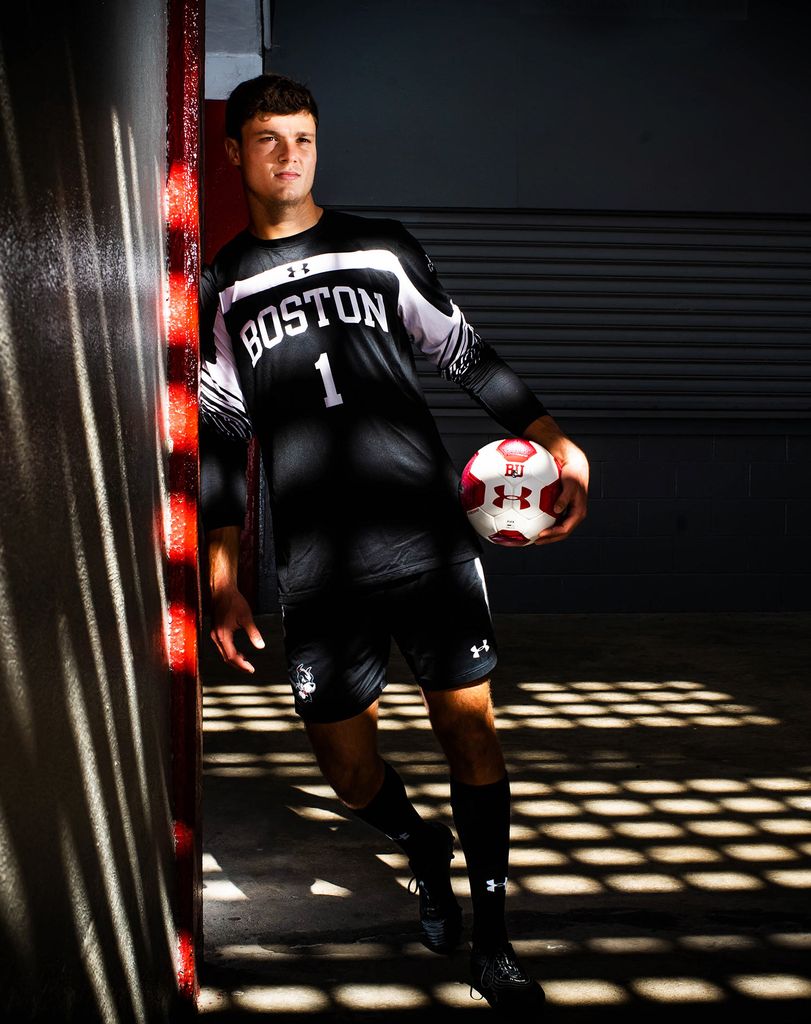
“We have to train at a high level every day; even though we aren’t playing games, we’re using this time to get better…. We want to be one step ahead of the other teams.”
Michael Stone (CAS’21)
Photo by Jackie Ricciardi
I would say another tough thing is keeping track of all the different Zoom links and schedules. Now everything is planned to the minute because you can’t just grab someone for five minutes after class.
Kong: There are lots of things I don’t like about remote learning. The etiquette is different. In normal in-person classes, I sit up front to keep myself accountable, so if I’m not paying attention, it’s really obvious and embarrassing. But in these big classes, there are so many faces, and it’s kind of hard to take it as seriously, I guess.
In the lab section that I teach, I place the students in breakout rooms sometimes on Zoom. I’m not going to make an announcement that I’m going to the bathroom, but I don’t want them to look for me and not see me on the screen, so I made a little sign to hang on my computer that says, “Bathroom break, LOL.”
Thelemaque: I’m a very sociable, very interpersonal person. I’m about to head over to a meeting for my Black Thought class, and I feel like that would have been an invaluable experience if it was taught in person. It’s still a wonderful class and I’m learning a lot, but I miss being able to say something and then see somebody across the room getting ready to respond.
Dining halls have one-way traffic pathways and six-foot distancing markers. Salad bars and other self-serve areas are gone, and capacity has been reduced. Students can eat inside, either by themselves or with their “household,” meaning the people they live with.
Stone: I got an apartment meal plan, since we have a kitchen in our suite. I’m already tired of cooking for myself. In the beginning of the year I was trying to cook some difficult dishes, and now I’ve transitioned to throwing spices and sauce on some chicken. I try to make complete meals, with rice, couscous, or pasta, and a vegetable like broccoli, spinach, or carrots. I’ve transitioned from thinking I was on Top Chef to just making sure I have food for the week ahead. Cooking for myself has really made me gain respect for my parents, since they do all the cooking when I’m home.
Thelemaque: They renovated the George Sherman Union; you can sit outside or at single tables. It feels like an open-air market. And you have to order ahead on GrubHub. There’s so much less human contact with everything, which is to be expected, but I miss it a little bit. I miss seeing cashiers Wendy and Maria in the GSU every morning, and Bridget at Starbucks. I miss those little moments and building connections with people like that. I miss being able to casually invite someone over to dinner, getting a drink with someone.
Clubs are choosing to meet virtually or outside, since students aren’t allowed to gather in large groups.
Kong: I am the treasurer for the Choral Society. Last spring, we picked one of our favorite songs and did a virtual performance, and we’re going to do the same thing this semester. We sing separately and then it’s edited together. It’s really weird. The reason most of us join the group is to sing with a group of people. For me, it was also a way to keep up with my musical skills, because I played piano for years and then I sang in the choir in high school. So I’m glad that I still get the experience of learning music. Normally, you respond to each other, you start and stop when you’re doing it live. Now, it feels like watching a YouTube tutorial. But I guess the upside is that the finished product is like a music video—it’s more shareable on social media and more people are getting to experience our work.
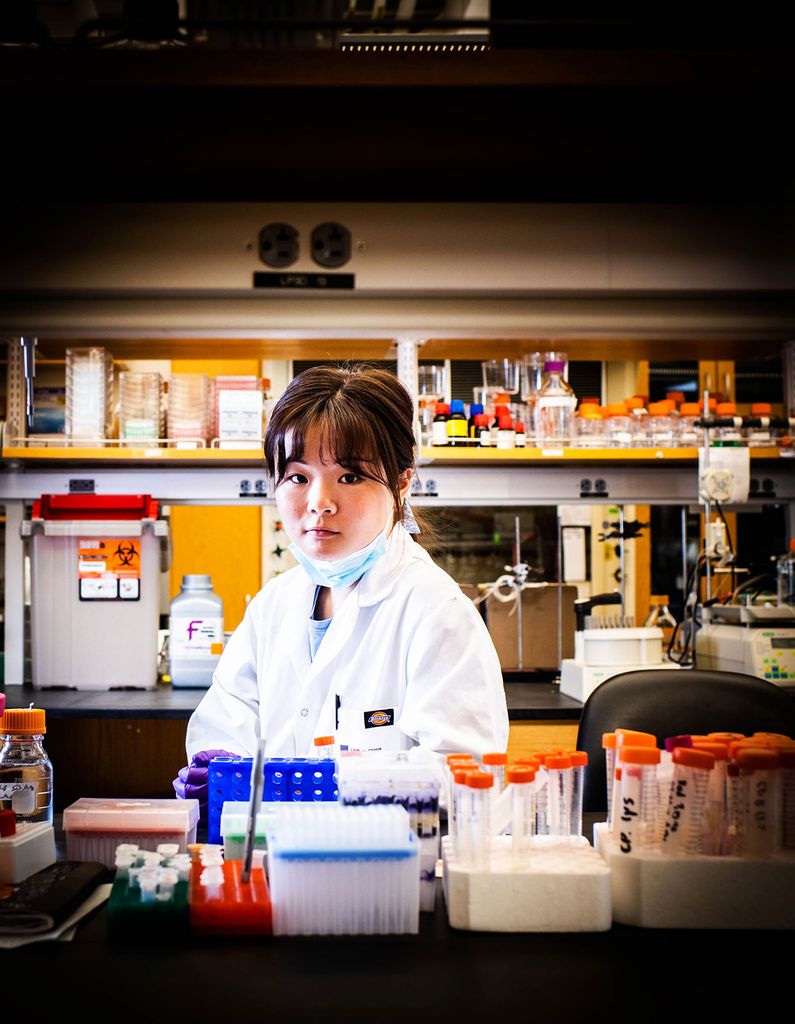
Sunnie Kong (CAS’21, GRS’21)
Photo by Jackie Ricciardi
Although sports seasons have been canceled, practices have been allowed to continue. For the men’s soccer team, a new semester meant a new coaching staff and freshman players.
Stone: We train in the morning. We’re still practicing and training five days a week—a mix of drills, shooting games, weight lifting. Everyone came out flying that first practice because we hadn’t played in so long, and we are so excited to be back. We have a new coaching staff, so we have a lot to work on and develop. It’s good, but tiring, getting back into the swing of things. Under Armour came out with a new exercise mask that doesn’t get stuck to your face so you can breathe. It’s more manageable than a typical mask.
It’s not that tough to keep up the intensity and spirit even though we aren’t competing. I think it starts from the team culture, from the coach down to us as the leaders. We have to train at a high level every day; even though we aren’t playing games, we’re using this time to get better…because when we finally get to play games, we want to be one step ahead of the other teams.
Being on the team makes us a lot more cautious and a lot more aware, because our actions will not only affect us, but could potentially affect the entire team. Now, there are talks to try to have a spring season, though I’m not sure of the likelihood or the feasibility. There’s talk of also prolonging your time here—for instance, applying for a graduate program and continuing to play for the team while in grad school, if it’s approved that the fall athletes are granted one additional year of eligibility [the University is still waiting on word about this from the Patriot League]. And I think that’s why a lot of us aren’t really too upset about not playing this semester.
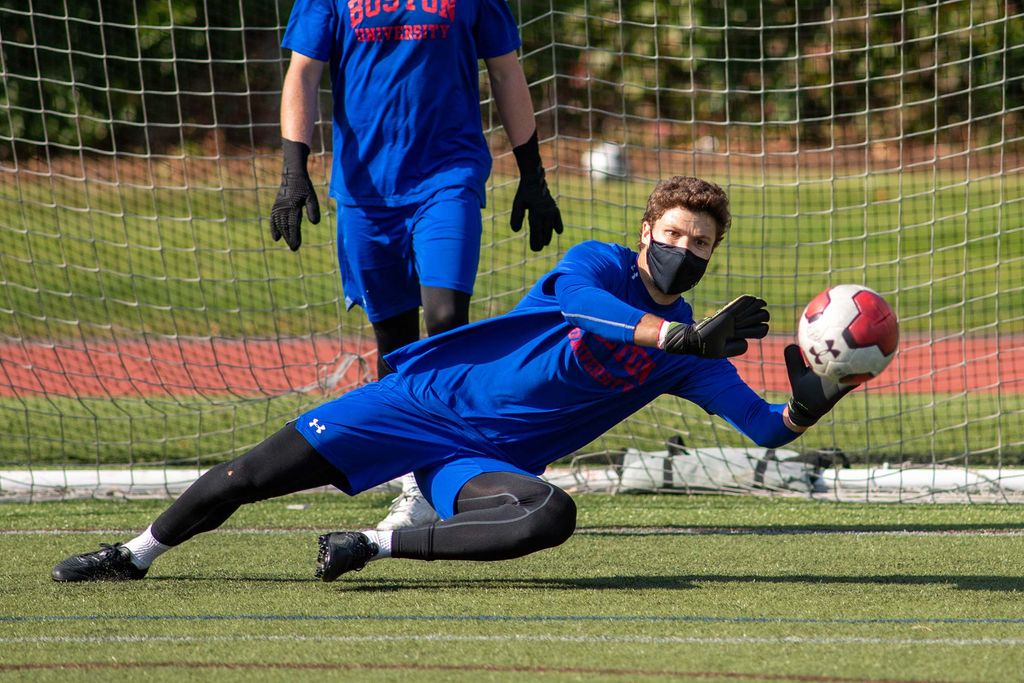
Students are encouraged to socialize with the people they live with. The University has warned that gathering in a crowd of 25 or more people will mean suspension, with no tuition refund.
Stone: Some people are a little more willing to go see friends at their house or go out to dinner, and then other people are OK with just staying home. Last Saturday night, there was an MLS game and an NBA playoff game on, so me and a few friends stayed home to watch. I hadn’t caught up with them for a while, so we were just laughing all night.
Kong: My friends and I like to get our food and eat on the COM lawn and the BU Beach…. We don’t really have a contingency plan for when it gets cold.
Thelemaque: The best part about being back is seeing everybody. We’ve been finding cool restaurants that we haven’t visited before and taking advantage of the outdoor seating. The other day we wanted to go to the beach so we rented a Zipcar instead of hopping on the T. It’s just been finding fun things that you can do with three or four people instead of going to huge festivities.
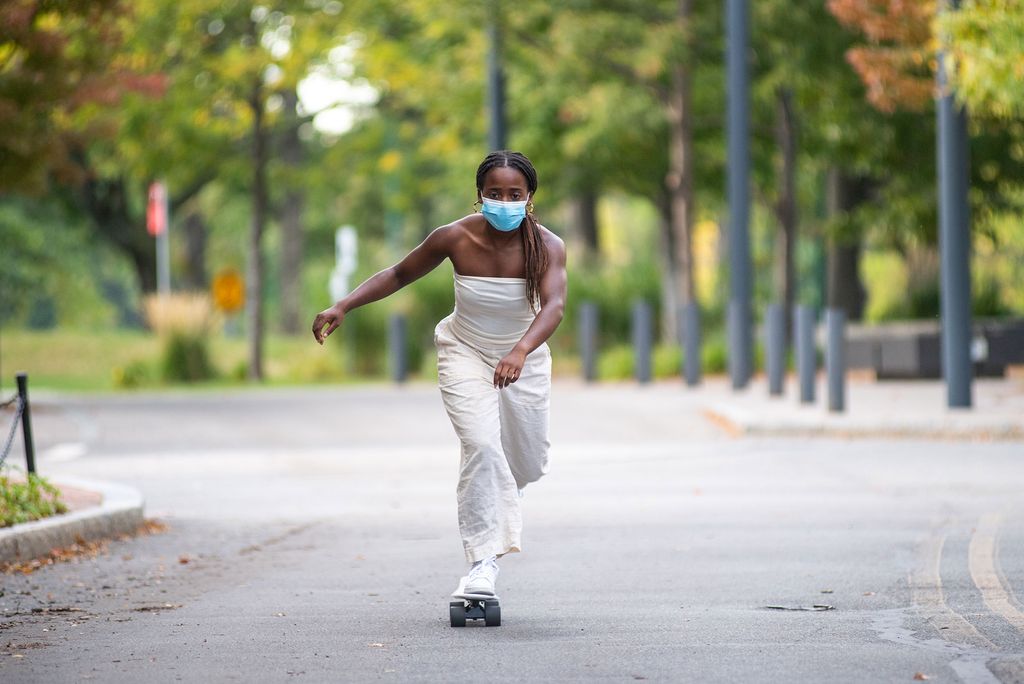
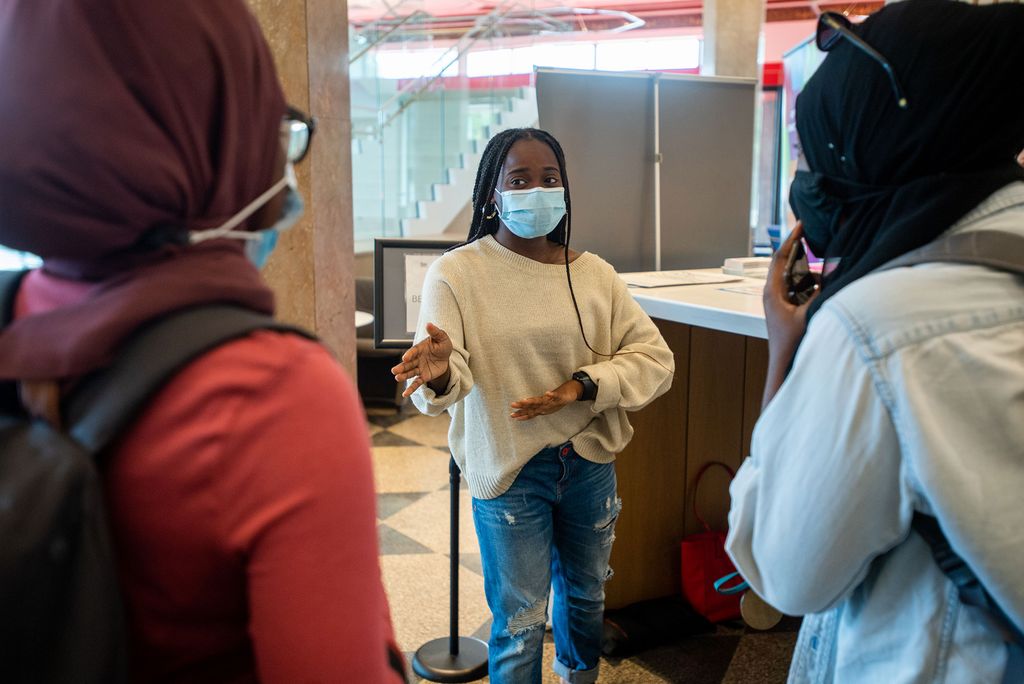
Thelemaque, a public relations major who describes herself as “very sociable,” is a student ambassador at the Howard Thurman Center for Common Ground, an active member of the Black student union Umoja, and an intern at communications firm Ketchum. Photos by Cydney Scott
I think what I miss the most is that I can’t just walk up to random people anymore and start a conversation. I took my Myers-Briggs test, and I am 93 percent extroverted. So I need people to survive. It’s very hard out here for a little extrovert, I’ll be honest.
Kong: I do see some behavior around campus that concerns me, but I feel like the general response from the student community is really comforting. I really believe that the vast majority of students are going to take all the precautions to make sure that we stay here.
BU has announced the spring schedule, but no official decision has been made about Commencement.
Stone: My friends and I would love nothing more than to have a big graduation, and be able to do bigger group activities. But we know we can’t right now.
Kong: I think most people realize that spring semester will be hybrid. I thought about ending senior year this way a lot when I was here this summer, because it was my first time spending it in Boston. I was thinking how I hadn’t taken advantage of the city enough. But I explored this summer and I’m trying to experience the city a little more.
Thelemaque: My graduation party is something I’ve been thinking about since I walked on campus as a freshman, and thinking how I was going to get all of my friends and family together to celebrate. Not being able to do that is certainly disheartening. I want to be able to invite all of my family from Haiti, and my aunts and uncles from New York.
I’m definitely hoping and crossing my fingers that come May 2021 there’s at least some sort of in-person ritual that we can do. I’m a Scarlet Key recipient, and I want to be tapped by that sword, in person. But we’ll roll with the punches.

Comments & Discussion
Boston University moderates comments to facilitate an informed, substantive, civil conversation. Abusive, profane, self-promotional, misleading, incoherent or off-topic comments will be rejected. Moderators are staffed during regular business hours (EST) and can only accept comments written in English. Statistics or facts must include a citation or a link to the citation.